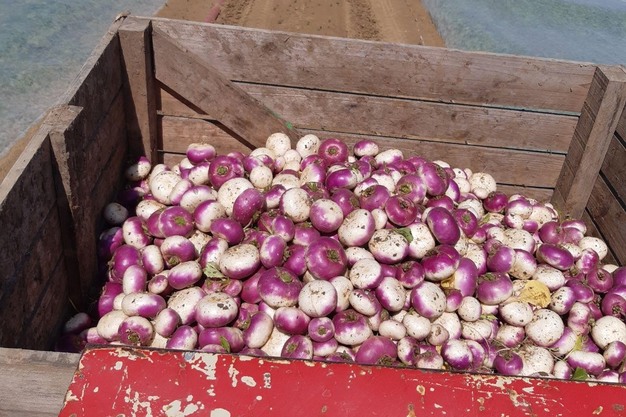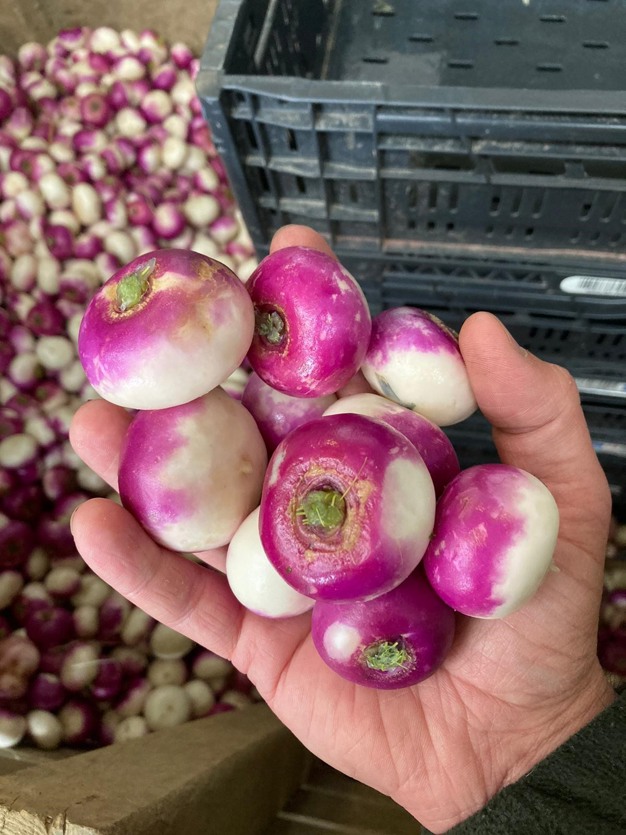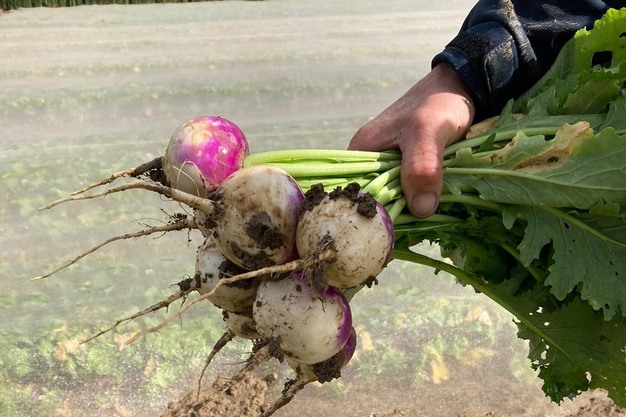The current weather can be tough on some summer produce in terms of both consumption and production, but it has been quite favorable for other vegetables. It is the case for turnips, marketed by Le Marché de Phalempin, a producers' cooperative of 230 members in the Hauts-de-France region. "We produce 50,000 tons of vegetables a year, half of which are endives. The growers are the ones who keep the sector going, organizing themselves to have more weight in terms of trade. It is a tool they have created and it belongs to them," explains Marie-Amélie Decherf, communication and marketing manager at Le Marché de Phalempin. Although the cooperative was initially built around endives, it has since diversified into a wide range of vegetables and fruit. "We produce cauliflower, carrots, leeks, onions, cabbage, squash, organic lettuce, apples and pears, as well as strawberries, rhubarb and turnips, of which we sell 1,500 tons a year," explains Camille Declerck, vegetable crop communication manager at Le Marché de Phalempin.

Good yields that sold well
The cooperative has 4 turnip growers, including Sylvain Delecroix. "We started sowing in February and harvested from mid-May to mid-February." Production is therefore virtually year-round. Although the bulk of the harvest takes place in September/October, to keep pace with consumption which increases as autumn approaches, the turnip market is currently quite active. "The weather has been favorable to the crop, so we have had good yields and consumption. This is a good year, and as far as we are concerned, the weather has also helped with sales!"
As for prices, given that all production basins were active, there was no shortage, and prices remained fairly stable. "We have, however, noticed a downward trend over the last couple of weeks, since the weather has improved," explains Sylvain.

A labor-intensive crop
According to Marie-Amélie Decherf, it is very important that growers' remuneration does not fall below a certain threshold, to remain consistent with the work of the growers. "Turnips are labor-intensive vegetables. This is particularly true for flat turnips, which are harvested by hand. To cope with pests while using as few phytosanitary products as possible, we cover the turnips from the first day until the last to limit attacks by flies and other insects.
Depending on the orders received the day before, we harvest the turnips in the morning and take them to the shed to be cut - the roots and collars removed - washed, graded and packaged in the afternoon," according to Sylvain.

Harvest according to orders and packing on site to guarantee freshness
The cooperative does everything in its power to guarantee maximum freshness for its clients, with an optimized logistics system. "It can take as little as 24 hours from harvest to arrival on the shelves. We have a pick-up system with a truck that goes round the farms in the morning, so the growers do not have to travel. The turnips are then passed on to some 20 order pickers. Then, the sales staff start selling as the orders are being packed. The aim is to work on a just-in-time basis, so as to be as close as possible to market needs and guarantee optimal freshness for our clients."
The turnips sold by Le Marché de Phalempin are available in sizes 40/60 and 60/80, packaged in 1kg nets or 5kg bulk. The fruit and vegetables are marketed by sales offices such as Prymex and Santerleg.
For more information:
Marie-Amélie Decherf
Marché de Phalempin
[email protected]
